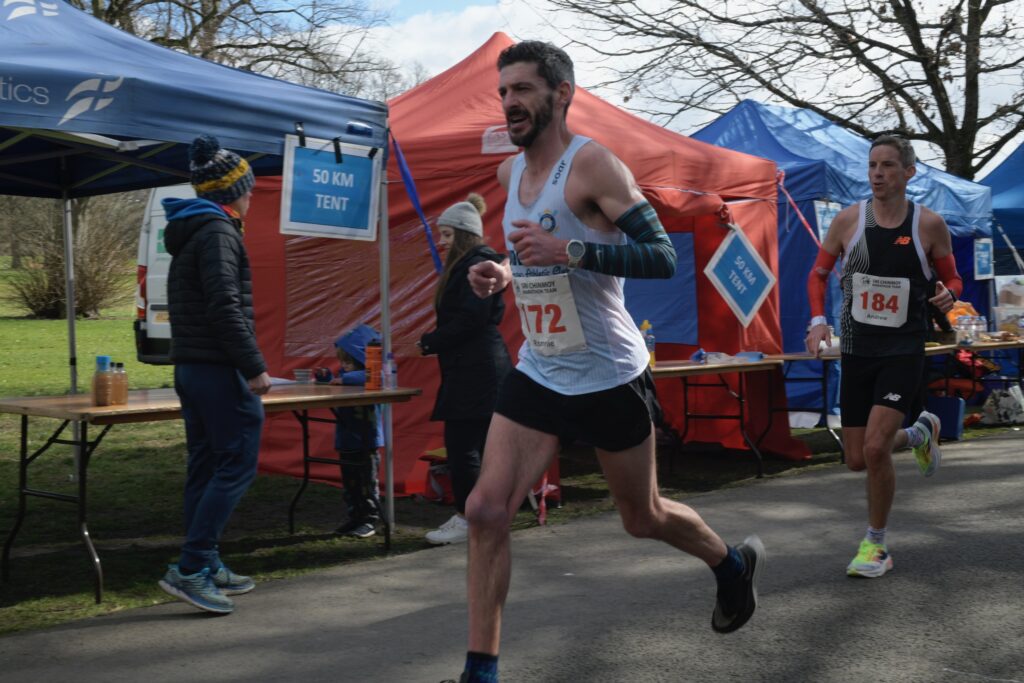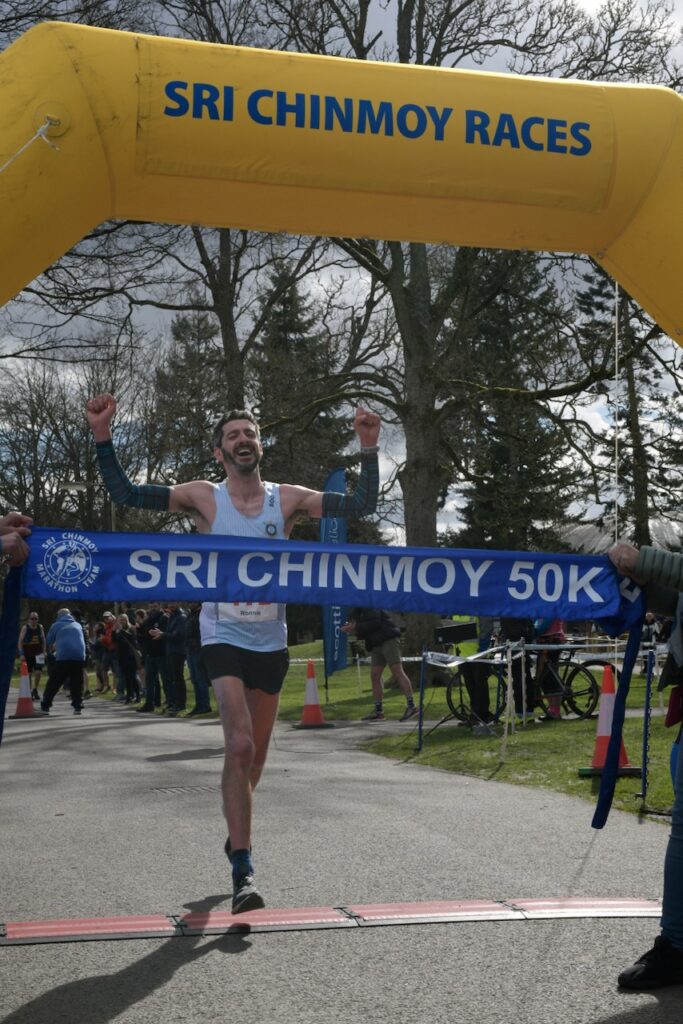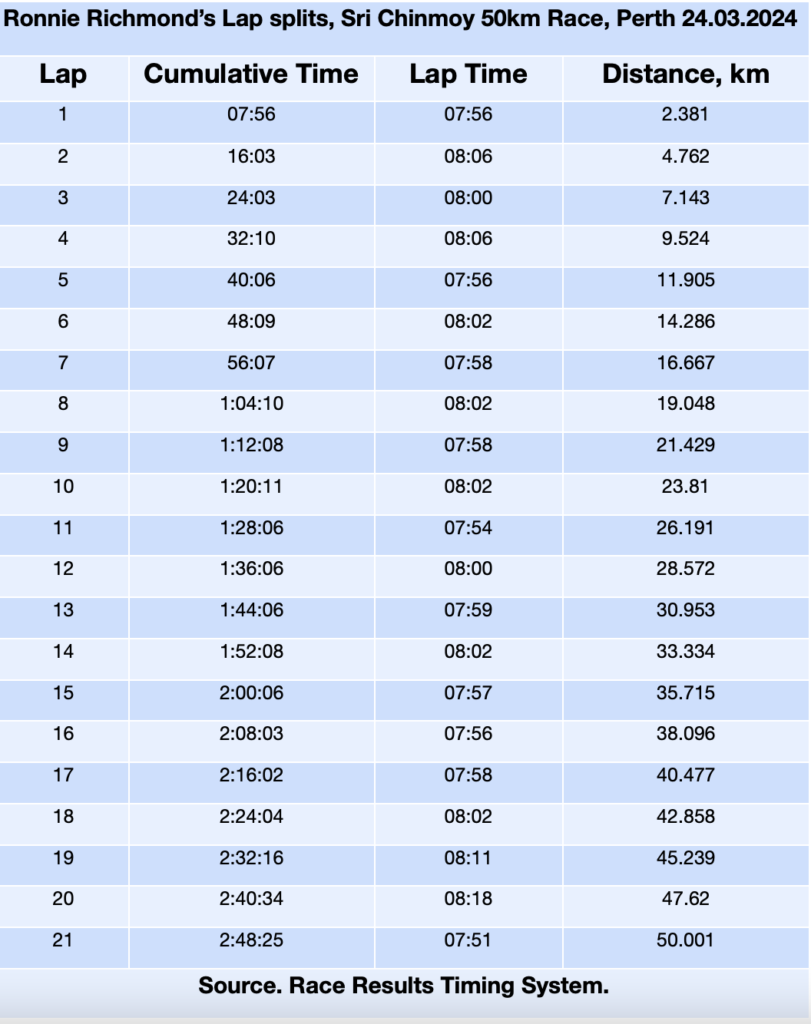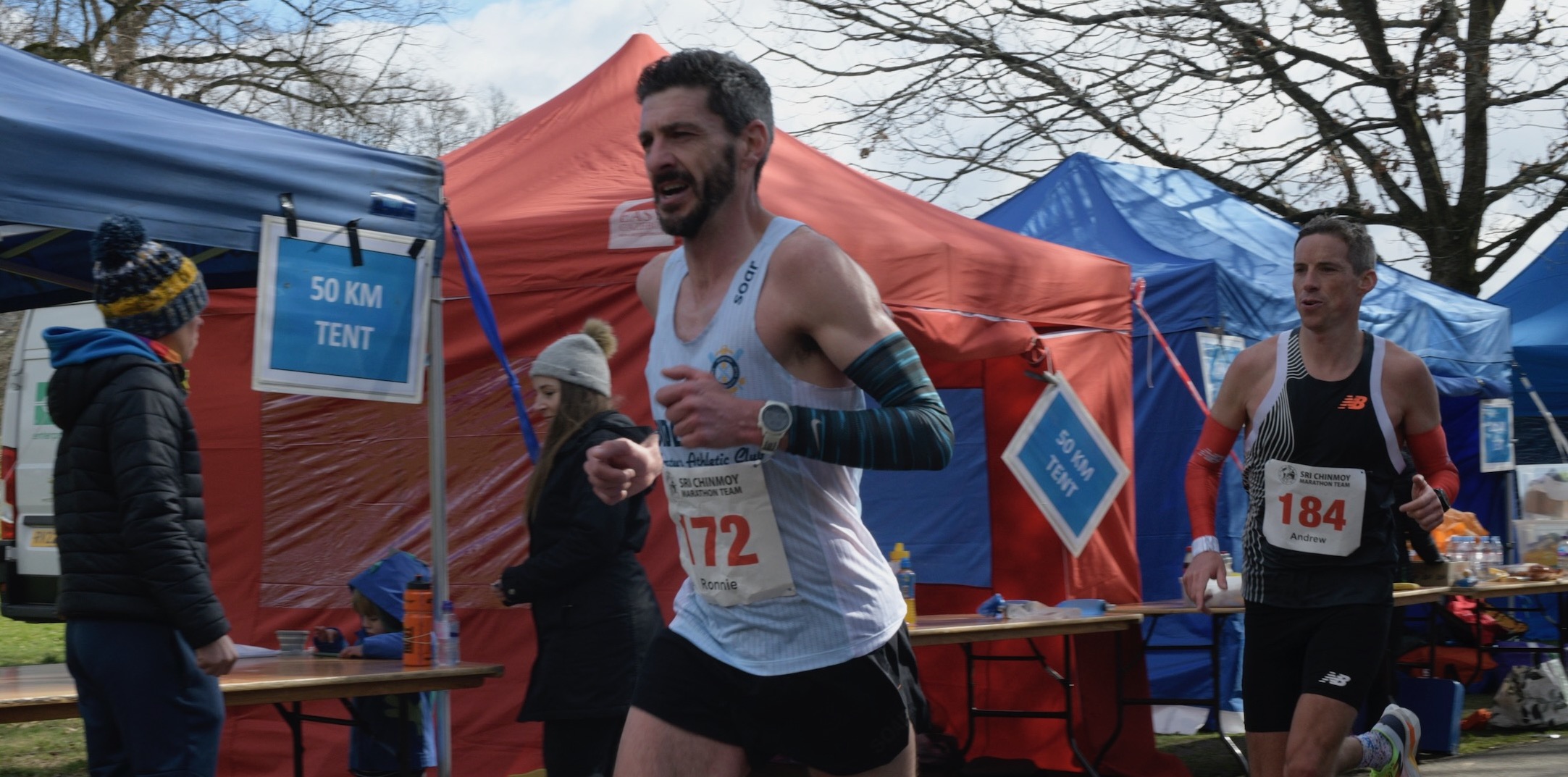Ronnie Richmond was crowned UK 50km champion, on Sunday 24th March. In a thrilling race with 2nd placed Andy Davies, they both broke the previous UK 50km road record. We talked to him about his running journey, his training, how his race unfolded at Perth and what his future plans are.

Sign up to receive our newsletter alerting you to new posts
The journey from footballer to marathon runner.
AS. First, I have to ask, how are you feeling after last week’s efforts?
RR. I am pretty good. Last week was very, very easy. I didn’t do a lot. I’m normally really bad after a hard race. I go off the boil and relax quite a bit, and then come back again slowly.
AS. So you run for Bideford in North Devon? Do you live in the town or outside the town?
RR. I live in Barnstaple, so I am about 10 miles away.
AS. So, who is Ronnie Richmond? When did he start running? How did he get into running?
RR. I look at a lot of guys my age, you know, that are running well and getting better, and we all roughly come from a similar background. As a youngster, I enjoyed running, but I wasn’t the best. I was almost a jack of all sports.
I was good at everything, but I was never really the master at any sport. Athletics-wise, I used to jump into the teams that were short, but I could jump in at 100 metres and 1500 metres. I had quite a range on me. I played a lot of football and was in my teacher’s team at the weekend. I was fast and agile, but I was incredibly fit as well. I had an engine on me. It wasn’t really until 2009, in my mid-twenties, that people were saying, “Oh, you could be quite a good runner if you wanted to. I was like, “No.that doesn’t really interest me, but one thing that did interest me was the London Marathon.
I think after the fifth year of trying, I actually did get in.
First Marathon experience.
That’s really when my proper running journey started. I just thought I could play football twice a week, do a couple of training sessions and then maybe go for a 10, maybe 15-mile run and that would be fine. Back then, I didn’t have a GPS watch. I just looked on Map My Run and thought, “Oh that’s a 15-mile loop. That’s a 10-mile loop. I’ll go and run that, I’ve got my Casio”. I will be fine.
Yeah, so then I got to the London Marathon, and it was a horrible experience. I think I did 3 hours 40 something and just came away from that experience going, “That is horrible. I never want to do that again.EVER!”
I thought about it though, as you do., I thought I might want to get into running again. Then, I just got a random email from Adidas, saying,” We’ve got 10 places available. Enter this. Enter your details and enter the ballot.” I did and I won it. And from that point on, like, actually, I knew I needed to do this with a little bit more structure.
I got myself a GPS watch but still, for three years maybe, four years, I was only doing probably about 30 miles a week. I was still playing football each week. I joined the local running club, North Devon Road Runners. I’d go there once a week, but I was only doing 30 miles maximum a week. That was getting me around about marathons in 2:50, and 2:48, but I wasn’t progressing beyond that.
AS. You were obviously doing something right, though. Winding forward a bit, you’ve slowly improved your marathon.
Around 2020 or 2021, you seem to improve, running 2:21 at the Manchester Marathon. What did you put that down to?
Was that being with the club? Were you getting some advice then?
RR. In 2013, I moved to Bideford Athletic Club. My first local running club was North Devon Road Runners. Me and another runner were just too good for our lovely local club, and felt we had got so far, but we needed the next step, and Bideford AC was that next step. They had some good runners and coaches there. We decided to cross over, and all of a sudden, I was seeing athletes who were way better than me and had very good marathon times, halves, 5Ks, that range and there was structure to their training as well
Breaking 2 hours 30 minutes.
I just looked at everyone else’s training, and all of a sudden, I go through the classic club training program where you go to the club session twice a week. You do whatever’s on, then you do your long run on Sunday, and you fill everything else in with a little bit of this and a little bit of that. That approach got me down to 2:30. It was at that point, that I almost took my own training into account. That was 2015, I think. I ran Frankfurt and dipped under 2:30 for the first time, and just started adapting things that suited my body and my ways of working rather than other people’s.
I kept plugging away working on little things like my form, had a few injuries, then in 2019 ran Manchester in 2:21
Manchester, again was really where it all turned. I knew I could probably run under 2:20. After that, I almost shifted my training to a Canova-style training base, so it was specific to marathon training. That just worked for me. If you’re tired, you have an extra rest day. I’ve just adapted it. What I’m on now is a hybrid Canova. There are a lot of sessions that he does that I really, really like, and they are my staple sessions.
You have to be a bit flexible as well. I get a little bit irritated sometimes when people say, “Oh. You’ve got to train like this. You’ve got to train like that. But everyone’s different. The best way to become an ideal athlete and improve yourself is to try all these different philosophies and find what works for your body. I’ve tried Lydiard’s training in the past. High mileage, with slow miles as well.
Finally cracking 2 hours 20 Minutes.
AS. Fast forward to 2022, and at Manchester again, you improve to 2:16, so you’re doing something right.
RR. I’m quite happy with how my running journey has gone. I’ve also been quite sensible most of the time. I’ve only done one marathon a year, most years. There’s a reason behind that as I find that my body just needs to recover. I think sometimes we’re too quick to just jump on it and do another marathon in six months or do a 10k in a couple of weeks. I think you need to allow your body to recover properly, and mentally as well. if you go for a proper marathon block, you’re tired. You want to give your brain a rest as well. I’ve always been very good at just adding one extra thing. So next time I come to a marathon block, I’ll add one thing. I’m not going to add 10 different things to it, just add one extra thing.
Then you’ll see how it’s progressing and if it’s working or not.
AS. In terms of other things, you talked about looking at your form. Do you look at other things in trying to make that whole wheel turn smoothly? Do you avidly look at how much you’re sleeping and how much you’re resting?
RR.Yes. I used to love looking at scientific papers and analysing the data. Sleep is a big thing. Unfortunately, I’ve got a three-year-old who hates sleep. He’s nearly four now, but for the last four years, I’ve been running pretty much on empty. I do look at sleep, but it’s something I can’t adjust. I’m a postie, so am up at five am most mornings. I’ve looked at my form and my running form and technique are not ideal. I know there are certain things that you can adjust. I had my form analysed before Manchester two years ago. Below my hips was pretty good. My running gait and my knees weren’t too bad. My lean isn’t too bad either. It looks like Andy Davis is very similar, I think. We look like we’re leaning quite far forward.
It’s the hips, and they’re just tilting forward. So again, we did a lot of work trying to make me more efficient. Over a marathon, if you can be 1% more efficient, you’re equating to 30 seconds or a minute there.
GB 50km selection 2022 and preparing for his 2nd 50km.
AS. Your 2:16 in Manchester got you selected for the GB 50km team that year in Spain, which was your first 50km. Looking at Perth, your training block building up to Perth wasn’t perfect. Tell us about that.
RR. I spent the majority of last year injured. I think that was down to the fact that I had done three marathons back to back. My body just broke down. I spent a lot of last year with ongoing injuries, so training was very interrupted. I had Perth as a target and I remember messaging you to see when entries would fill, as I wasn’t sure if I would be ready or not.
Even from November, I was getting little niggles and had covid, so the training block wasn’t perfect.
I was surprised at how quickly I bounced back. In the fourth week, I think I did something decent. It might been something like five times 5k at 5.20 pace, and it, you know, it didn’t feel hard and my heart rate wasn’t ridiculous. So that gave me a bit of a boost but then had another blip when a dog knocked me down on my post-round, and I suffered whiplash in my back.
The interrupted train block was almost like a bit of a blessing in disguise because I was thinking Perth doesn’t really matter. I’m just going to train up best I can, and go do it.
I just want to run 20 miles at around about 5:20 pace, just slower than my marathon pace, and then after that, I would take it one lap at a time before I start feeling fatigued, or I just knock it back to 5:30’s and I would still be there or thereabouts
AS. Coming into the race I’m assuming you were aware Andy( Andrew Davies) had entered as well.
RR. Yes, I saw something on Strava, a week or two weeks before, and I pinged him a message. I thought I’d say, “I’m running it as well. What sort of times are you thinking of? And I thought he’d probably go a bit too quick for me if I’m brutally honest, you know,
I sort of said, “Look, you know, I’m going to use it as a training run if I can help you, fine.”
How the Perth race unfolded

Andy, on paper, should have been miles ahead of me but we had a conversation. I wanted to go around 5.20 pace for 20 miles at least. If I can go a little bit further, brilliant. He wanted to go roughly at that pace as well. We decided a week before that we would aim to share the lead every other lap. We had a quick chat before the race to aim to try and run a 5:20 pace for every lap.
AS. Looking from the sidelines, it was obvious that you and Andy were committed from the start and feeding off each other.
RR. I would say it was easy, without sounding arrogant. We were both comfortable and chatting to each other along the course. We were chatting with other runners as we went past too. I think we had a bird conversation with Alex Milne halfway through the race. Alex was chatting about a couple of birds he had seen on the river and saying,” I saw plenty of them yesterday,” It was quite relaxed, and for a large part of that race, we were probably running within ourselves. There are two factors there as well. You’ve got to remember that for Andy, running at 5 minutes 20 seconds is probably 15 seconds slower than his marathon pace.
For me, you know, that’s around seven seconds slower than my marathon pace so for large periods it was comfortable for me as well.
AS. When did you realize the race that, you could both be on for sub 2hrs 50 as well?
RR. Beforehand, we had decided that we were going to go for that no matter what.
AS. Was it Dan’s record you had in mind?
RR. Yes, Dan’s record as well. But also for me, my PB, my previous PB was 2:56.
AS. So how did the last few laps unfold
RR. I’d missed a drink bottle at lap 16. and I just started feeling that my legs were
just getting tired. Nothing was seizing up, you know, nothing was going drastically wrong, but I just felt the energy was going for me a little bit. I said to Andy, “I’m still a little bit ropey, you might have to go ahead. I said, I’ll do my lap and I’ll see how I go. So I took the 19th lap, )(I was the odds, and he was the evens. and I was like, right, just come on, let’s just get through this lap, let’s give him one more lap, as I’m the sideshow here, but let’s keep it going, you know.
I could feel everything being drained on that lap. I was like, Andy, go, I can’t hold this pace.
On the penultimate lap ( Lap 20) he went away quite quickly and opened up a lead, but not too much that I was falling way back. As the last lap began I began to feel strong again and when we hit the riverside, I saw he wasn’t getting any further ahead. He was, if anything, coming back to me slightly. All of a sudden, what seemed like a 100-meter lead turned into 80, then 60 metres and I’m feeling quite good again now. By the time we got to the far end, I had probably closed to around about 50. metres
All of a sudden, that 50 meters evaporates really quickly. Then you have a decision to make, don’t you? You don’t know whether to just sneak up on him, or whether he is tired, and you think, “Wel,l do I sit behind him and out-kick him or do I just go past him and then does he latch on to me and then get an easy draft in? So I think that I had caught him with around 300 to go and within like five meters of catching him I decided to go past really hard and managed to maintain through to the finish line.
British Champion and new GB road record.
AS.So you take the win in 2:48 25 with Andy eight seconds back in 2:48:33 also under Dan Nash’s previous 50km road record of 2:49:01 How does it feel to be a British record holder?
NOTE Geoff Norman still has a track time of 2:48:06 from 1980
RR. It feels really good but I almost feel a little bit guilty really, because it could have been Andy taking the win too. I was told it might have been a world O/40 men’s 50km record too.
Note: Current stats indicate this but ongoing checks are being made to check this one.
Ronnie Richmond . UK 50km Champion and new road record Lap Splits
Ronnie’s new GB road record time of 2:48:25 is an average of 3 minutes 22 seconds per kilometre or 5 minutes 25 seconds per mile.Andy Davies who was second ,only 8 seconds behind Ronnie, set a new Welsh 50km record in placing 2nd on the GB all time road lists ahead of his fellow Welshman Dan Nash.

Advice for anyone thinking of moving from Marathon to 50km.
AS. So you’ve obviously made the transition from marathon to 50K very well. Yeah. What advice would you have for someone who’s sort of sitting around a 2:20-ish marathon, maybe a bit slower, maybe a bit faster?
What do they have to do to turn their mind to a 50K, should they want to do so?
Do they have to change anything drastically?
RR. I don’t think they do. You need to be a little more sensible and train at a slightly lower intensity. In terms of mileage. In that transition period, if you’re already doing marathon training, I don’t think you have to adjust too much. Maybe put a couple of longer runs in, just to adjust your body to running for up to 3 hours or longer. In terms of what you do, I think you run specific long sessions. You get your tempo runs in and your marathon pace efforts in. I believe that there are lots of people out there who could transition from marathon to 50k very easily without changing too much at all.
AS. You’ve been to the European 50km Championships. Hopefully, you get a chance to go to more. You’ve seen what the Spanish, the Germans and the Japanese are doing. They’re actually finding their fast marathon runners and encouraging them, much the way that we are encouraging the top British marathon runners to at least look at 50k if they’re not making marathon teams.
There is a chance to get a British vest at a distance that they might not have thought about.
RR, Yes. At European and world level, that’s the calibre you should be attracting, and it is a different level.
Future Plans
AS. Looking ahead, would 100K ever tempt you? Did having a 100k race taking place at the same time as your 50 km, have any impact on you? Were you inspired by them?
RR. Yes. I like multi-lap courses anyway because you can break it down. Seeing those 100km guys. That’s just a different level of running. It is inspiring because, you know, they’re not out there for two and a half or three hours. They’re out there for six, seven, eight, nine hours. And you know that’s a lot of running and effort.
I just don’t know whether I could do that or not. I’m good at marathons. I’m going to stick to that for now. I know where my strength is, and I’ll just stick with it.
I think, for me, my running has always been wanting to better myself. While I’m still getting quicker, I don’t necessarily want to move up in distance, if that makes sense.
What inspires Ronnie to run.
AS. You’ve brought me on to one of my final questions. I have always had a fascination with what I call, your outer runner and your inner runner. The outer runner is just getting your body fit, which is fine, but to go further, or even faster at what distances you have chosen, you often have to call on something else from somewhere. How do you call on that little extra something when you need it? Where do you find your inner inspiration, as it were, when things get tough? In training or racing?
RR. Well, again, I live in North Devon. I train on my own all the time, you know.
It is fabulous, but it’s also lonely, and you don’t get that pull of other people, do you? You can go on social media now and can see all these fantastic groups and it’s brilliant. They’re all pushing themselves, but down here I’m on my own. I train on my own most of the time. It’s quite hard, but doesn’t put any pressure on you. I go out when it’s pelting it down. We rarely get any wind that is under 15 miles an hour. You’re constantly running in challenging conditions. It toughens you up. You get soaking and you’re cold, but you can still enjoy it. Inspiration for me is bettering myself and trying to inspire my kids. That’s another reason why I run. I just want to inspire my children, not necessarily into running, but to look at you, and hopefully, they think, “Well. He’s not technically the best, but the amount of effort that he puts in, and he does put everything in, he can achieve, no matter what it may be, you know, whether it’s academically or a sport or whatever it may be, they can achieve something as well if they put the effort in. I think that’s where my inspiration comes when it gets hard. Yes, I am doing it for myself, but I’m also doing it for my family and just trying to make them proud. So yeah, that’s probably where the inspiration comes from.
AS. So immediately looking ahead. What’s next for Ronnie? Have you any big plans at all?
RR.Not realy. I know my body will need a rest now, and training-wise, I will slowly get back on it, gradually building the miles and maybe the intensity over the next few weeks. That will give me enough time to have a proper debrief. I’ll have a chat with my coach, Andrew Ingles, at the club. He is a knowledgeable sounding board, but I think we will probably go for an autumn marathon. I won’t start the big training block until late summer.
RR. For me, I just want to say thank you for the event that you put on. It was a cracking event. The course itself was quick, and all the support at the course was amazing.
AS. That seems like a good place to finish. Thanks for a fascinating chat..
FOR Further info on the Sri Chinmoy 100k/50k ultras
Watch a Short video with drone footage by Stuart Ross of Stuart Ross Media HERE
Full results from the Sri Chinmoy 100k/50 ultra races HERE
Our Blog on all the records that fell at Perth is HERE
PLEASE SHARE!
Thanks for reading . If you have enjoyed this post, do see our other ones HERE
If you have a comment, please feel free to add it below.
If you are inspired by this or think someone else you know will be, please do what you have to do by sharing. You all know how these things work by now:-) You can also follow me on Twitter and Instagram @tarittweets
Sign up to receive our newsletter alerting you to new posts
Adrian Tarit Stott.
The author is a former GB 24 hour ultra international with over 100 ultra race completions. He has also been involved organising ultra distance races for over 30 years. Still an active recreational runner, he is currently a member of UKA’s Ultra Running Advisory Group (URAG) and part of the selection and team management for both Scottish and GB ultra teams.He is also a freelance writer in his spare time, contributing articles and reports to several websites and magazines including Athletics Weekly and Irunfar.
